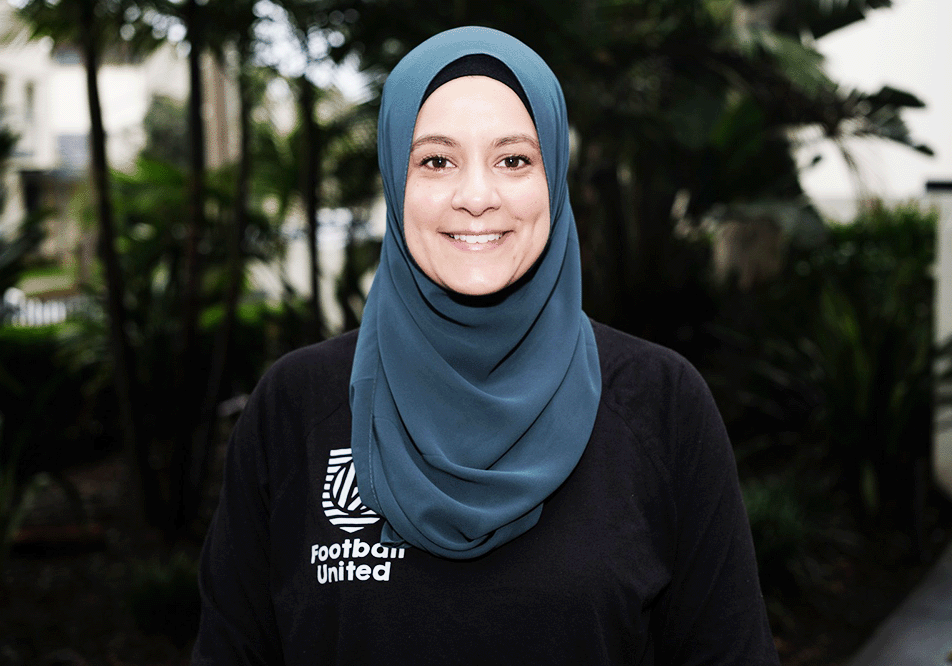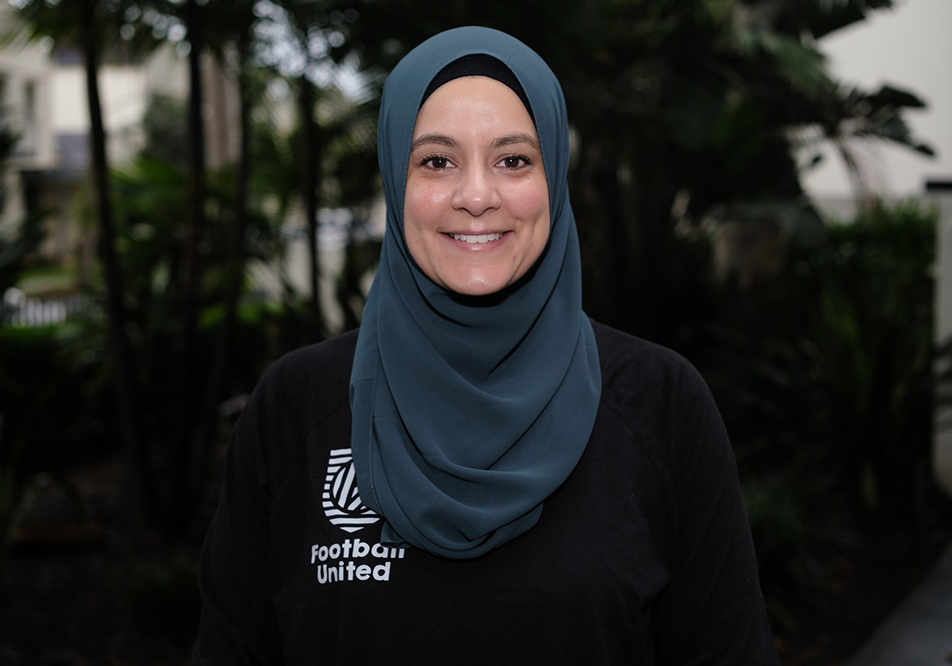Assmaah Helal: Sport for social change



Assmaah Helal is studying an MBAx (Social Impact) with the Centre for Social Impact UNSW and received a CSI scholarship in 2021.
Across living rooms and ovals the world over, sport provides excitement, and highs and lows, like nothing else. Whether it’s community sport or a regular team fitness challenge, it is also more than just physical exercise; sport helps develop confidence and resilience, provides a sense of belonging and allows people of different backgrounds to connect.
Assmaah Helal is no stranger to the opportunities and challenges sport can bring.
Growing up in a Muslim family of self-confessed football fanatics, her love of sport has taken the UNSW MBAx (Social Impact) student from player and coach to a career in community development, where she has worked with migrant resource centres in Western Sydney, encouraging more women from different faiths and backgrounds onto the playing field.
In 2017, she co-founded the Muslim Women in Sport Network , a global organisation to amplify the voices of Muslim women in sport.
Now, in her role as Operations Manager at Creating Chances , an evidence-based youth development organisation in Sydney, Assmaah and her team are using sport as a tool to promote outcomes in health, employment and education.
“Sport is not the outcome here; we’re not trying to develop athletes. We’re developing the best possible young people and helping them explore their potential,” says Assmaah.
Through their range of programs delivered in partnership with primary and secondary schools in NSW, the organisations supports young people, often from disrupted education and family backgrounds, to re-engage with the classroom.
Dismantling the barriers
Assmaah credits her can-do attitude to her sports-loving family. Her father in particular, encouraged her to lead an active, healthy lifestyle where there were no barriers to playing sport.
“I put on my boots and played football with the boys when I was about five or six years old. There were no girls’ teams at the time. I was a very shy, reserved child and sometimes I would get comments like, ‘you’re a girl, you shouldn’t be playing football’ and I didn’t know how to stand up for myself,” says Assmaah.
For a few years she took a break from football and tried individual sports, such as karate, swimming and tennis but soon realised that she missed the team aspect so went back to football.
At the same time, she was thinking about wearing the hijab as part of her religious faith.
“For me, this was a bit of a question, ‘Am I going to be accepted? Is the sport going to allow the hijab?’ I asked the club and they said ‘no problem’. So I played in my hijab.
"Looking around, I was the only one that stood out and as a teenager, you’re already self-conscious about your body. But I had good support from my family and my brothers to keep going, to be true to my identify and my beliefs.”
Connecting the dots
It's these same values instilled by her family that Assmaah is trying to develop through her work at Creating Chances.
“That’s what we want to do with Creating Chances. It’s about creating a safety net for young people to experience new things, make mistakes and learn from them.
“The idea is to connect the dots. We stress that sport is this world you can be in, but outside of that, there’s so much more to explore. We help them identify their own strengths, values, develop their CV and their interview skills, among other things.”
Studying Social Impact for Greater Outcomes
As her role developed, Assmaah realised that she needed to take a step back to better understand the strategic fit of the organisation and learn more about the nuances of collaboration versus competition for greater social impact. She enrolled in the MBAx program at UNSW, specialising in social impact.
After her first unit, she recreated a theory of change and program logic model for Creating Chances, so that it could be understood and articulated by everyone in the organisation and their external stakeholders.
“It was incredibly valuable looking at tools, concepts and frameworks that I could apply in a practical way to the work I was doing, especially the human-centered design approach where you take yourself, your experience and your bias out of the equation and listen to the people you want to serve,” says Assmaah.
"It also enabled me to apply a business mindset to how we approached and developed our growth strategy. Developing my strategic thinking, marketing and financial management skills enabled me to rethink our approach to sustaining and scaling our programs, as well as supporting the team to be part of that process too."
Assmaah is determined to meet the community where they’re at - and to create as many opportunities for inclusion so people have options to fit their needs.
“Having a respectful dialogue is so important. I think there is a definite shift in how people are engaging in activities and in broader society - and there’s a shift in people creating their own spaces where they feel welcomed and feel a sense of belonging,” says Assmaah.
Reflecting on the importance of values, Assmaah recalls a quote from boxing great, Muhammad Ali: “Service to others is the rent you pay for your room here on Earth.”
“These words really resonate with one of my core values of service to others, and my faith. Sharing my skills and experiences in whatever way I can to help my team and community who want to start up new things - my time, my efforts - that’s how I feel I can serve people.”
